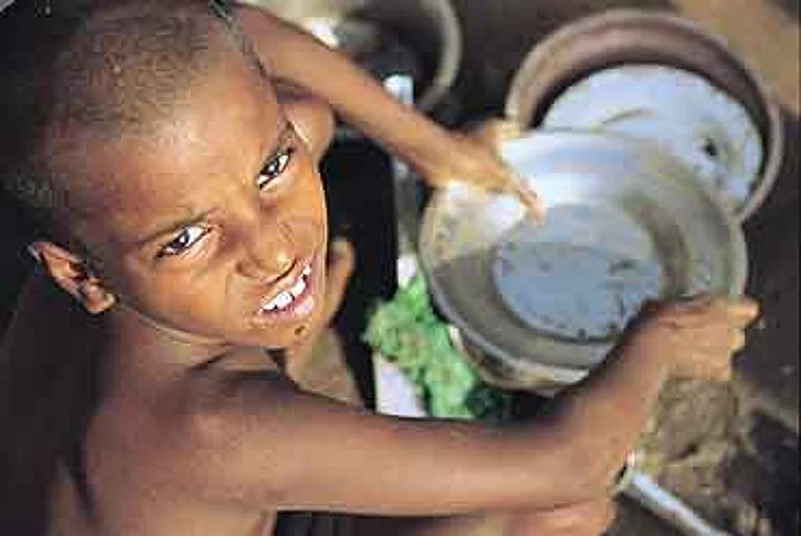Globalisation is a declaration of war on all other cultures, since it renders these ‘local’. But who see her or his culture as ‘local’ when it is central to our identity and who we are?
If globalisation is an object of constant mystification, the reason is its being, above all, an ideology: one that counts only gains, while losses are elided and consigned to non-monetary realms of experience, absorbed by society, humanity, environment or that inexhaustible toxic dump—the future. The economic calculus is a device for filtering out human pain, for muting cries of protest, burying its coercive violence beneath an overwhelming iconography of affluence.
With India’s growth rate at 7 per cent, who is going to contest the entry of India into the era of global integration, since the disintegration of cultures eludes the monitors that register only money? Characteristic of this reductive calculus is the pervasive reporting of tendentious success stories. Thus, aCNN account of an okra farm in Gujarat, which is supplying food for export, blithely asserts: "India, which used to be a food-deficit country, is now exporting to the markets of the world." To prove it, the happy workers earning two dollars a day smile for the camera. That this food-exporting country has hungry people—who knows how many—does not impair this prejudiced version of the world in which all are winners.
The image of India has been reworked in the past ten years: no longer the supplicant of the outstretched hand and begging bowl, it is now routinely portrayed in the West as a ‘threat’ to our competitiveness. Unlike China, which has taken away our manufactures, India has the more sinister role of filching the work of our brains, caught in its knowledge-based industries and bio-sciences.
India is now one of Asia’s waking giants, roused from its ancient slumber by the kiss of Western technology, to a destiny of perpetual growth and expansion. At the same time, a World Bank report says "the best available estimates suggest that inequality in India has been rising, but with no solid assessment of by how much". How bizarre it is that an accounting system, which prides itself on its adherence to the bottom line, should have so little idea of exactly how much inequality exists in one of the most unequal societies on earth.
When economic necessity takes precedence over human need, we have entered a strange twilight, where even the profoundest values are being redefined. In the monstrousmorality play of globalism, good and evil come to be remade in the image of wealth and poverty. The rich are no longer the monopolists of what the poor need for survival, but have become, through the mysterious arts of wealth creation to which they alone are privy, the supreme enabling agents of the subsistence of the poor.
But it is not simply in the economic arena that the casualties of globalism should be sought. It is often complacently asserted that India "can take the best of modernity and blend it with our tradition". The opposite is also possible: perhaps the falling ratio of surviving girl to boy children in therichest parts of India indicates the worst of all possible worlds, as does a recent revelation that one-third of cybercrime in India is related topornography.And how confident can India be in its traditional cherishing of the family, when the government is actually contemplating legislation making it compulsory for children and grandchildren to maintain their elders? The coming of the consumer society has also certainly given a boost to dowry demands.

Globalisation demolishes and reconstructs the psyche and the sensibility of the people. Nowhere is this more clear than in the structuring of human relationships. The pan-sexualising of society is sometimes portrayed by ‘progressives’ as one of the happier byproducts of this version of the internationalising of cultures. What was formerly passed over in silence is now in the open. Should this not be a source of rejoicing? We are seeing the impact of relationships of individual choice upon those formerly perceived as aspects of wider family obligations: sexual passion takes priority over the embeddedness of sexuality in a wider culture. The violent overthrow of roles in favour of relationships sets up some strange pathologies: the throwers of acid on the object of their unrequited affections, the reactions of those who have learned the savage lessons of a global deregulation of desire, which show up in the statistics for rape, violence against women, the sexualising of all transactions between men and women. This is not, of course, to suggest that traditional society was lacking in sexual or other forms of violence. It is simply that the centrality given to sexual gratification by the culture of globalism is inescapable; and when this comes into sudden explosive contact with Indian tradition, there are bound to be malign consequences.
It is always clear to people what they are being emancipated from: what are they are being delivered into is another matter. Because relief of poverty—a way out of oppression—have been among the most desperate needs, it is easy to see the prodigious wealth-creating capacity of capitalism as the only possible way forward. Its seductive imagery and 200-year-old promise that it can ‘cure’ poverty inhibit other societies from becoming wise in their own way. Out of its very wealth, it has conjured new forms of unimaginable poverties—like the multitudes of the dispossessed of New Orleans being flushed out of their hiding places by the waters of the Gulf.
It is a strange paradox that India, which might have taught the value of frugality, should have been so ready to throw away such values in order to enter into global competitive incontinence. It seems that India cannot wait to discover, along with the rest of humanity, what lies on the other side of the used-up resource base of the earth, the waste and prodigality, the multiple pollutions of globalism.
Mother India has been transformed into Miss World. Should we regard this as an assault upon rooted identity, or as a liberation from ancient cultural tyranny? Or does it mark the passing from one form of oppression to another? Could it be a mixture of both; and if so, who are the winners and losers in this epic transformation?
(Jeremy Seabrook is the author, most recently, of Consuming Cultures: Globalisation and Local Life)


























